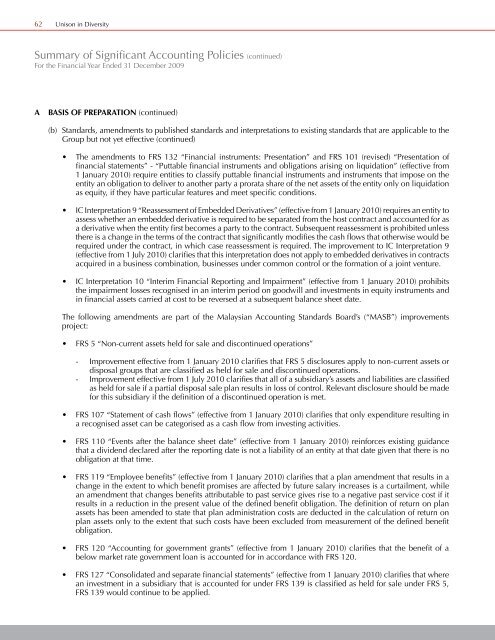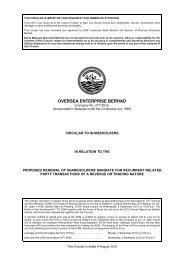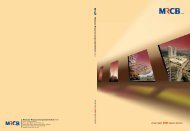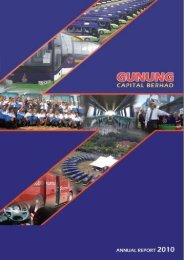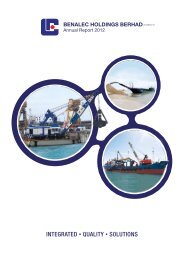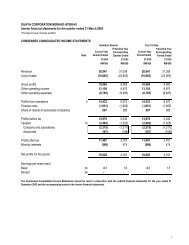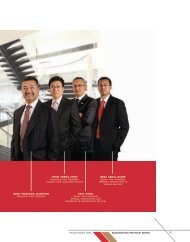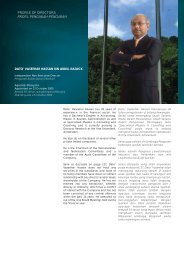DELEUM BERHAD UNISON IN DIVERSITY - ChartNexus
DELEUM BERHAD UNISON IN DIVERSITY - ChartNexus
DELEUM BERHAD UNISON IN DIVERSITY - ChartNexus
Create successful ePaper yourself
Turn your PDF publications into a flip-book with our unique Google optimized e-Paper software.
62 Unison in Diversity<br />
Summary of Significant Accounting Policies (continued)<br />
For the Financial Year Ended 31 December 2009<br />
A BASIS OF PREPARATION (continued)<br />
(b) Standards, amendments to published standards and interpretations to existing standards that are applicable to the<br />
Group but not yet effective (continued)<br />
• The amendments to FRS 132 “Financial instruments: Presentation” and FRS 101 (revised) “Presentation of<br />
financial statements” - “Puttable financial instruments and obligations arising on liquidation” (effective from<br />
1 January 2010) require entities to classify puttable financial instruments and instruments that impose on the<br />
entity an obligation to deliver to another party a prorata share of the net assets of the entity only on liquidation<br />
as equity, if they have particular features and meet specific conditions.<br />
• IC Interpretation 9 “Reassessment of Embedded Derivatives” (effective from 1 January 2010) requires an entity to<br />
assess whether an embedded derivative is required to be separated from the host contract and accounted for as<br />
a derivative when the entity first becomes a party to the contract. Subsequent reassessment is prohibited unless<br />
there is a change in the terms of the contract that significantly modifies the cash flows that otherwise would be<br />
required under the contract, in which case reassessment is required. The improvement to IC Interpretation 9<br />
(effective from 1 July 2010) clarifies that this interpretation does not apply to embedded derivatives in contracts<br />
acquired in a business combination, businesses under common control or the formation of a joint venture.<br />
• IC Interpretation 10 “Interim Financial Reporting and Impairment” (effective from 1 January 2010) prohibits<br />
the impairment losses recognised in an interim period on goodwill and investments in equity instruments and<br />
in financial assets carried at cost to be reversed at a subsequent balance sheet date.<br />
The following amendments are part of the Malaysian Accounting Standards Board’s (“MASB”) improvements<br />
project:<br />
• FRS 5 “Non-current assets held for sale and discontinued operations”<br />
- Improvement effective from 1 January 2010 clarifies that FRS 5 disclosures apply to non-current assets or<br />
disposal groups that are classified as held for sale and discontinued operations.<br />
- Improvement effective from 1 July 2010 clarifies that all of a subsidiary’s assets and liabilities are classified<br />
as held for sale if a partial disposal sale plan results in loss of control. Relevant disclosure should be made<br />
for this subsidiary if the definition of a discontinued operation is met.<br />
• FRS 107 “Statement of cash flows” (effective from 1 January 2010) clarifies that only expenditure resulting in<br />
a recognised asset can be categorised as a cash flow from investing activities.<br />
• FRS 110 “Events after the balance sheet date” (effective from 1 January 2010) reinforces existing guidance<br />
that a dividend declared after the reporting date is not a liability of an entity at that date given that there is no<br />
obligation at that time.<br />
• FRS 119 “Employee benefits” (effective from 1 January 2010) clarifies that a plan amendment that results in a<br />
change in the extent to which benefit promises are affected by future salary increases is a curtailment, while<br />
an amendment that changes benefits attributable to past service gives rise to a negative past service cost if it<br />
results in a reduction in the present value of the defined benefit obligation. The definition of return on plan<br />
assets has been amended to state that plan administration costs are deducted in the calculation of return on<br />
plan assets only to the extent that such costs have been excluded from measurement of the defined benefit<br />
obligation.<br />
• FRS 120 “Accounting for government grants” (effective from 1 January 2010) clarifies that the benefit of a<br />
below market rate government loan is accounted for in accordance with FRS 120.<br />
• FRS 127 “Consolidated and separate financial statements” (effective from 1 January 2010) clarifies that where<br />
an investment in a subsidiary that is accounted for under FRS 139 is classified as held for sale under FRS 5,<br />
FRS 139 would continue to be applied.


